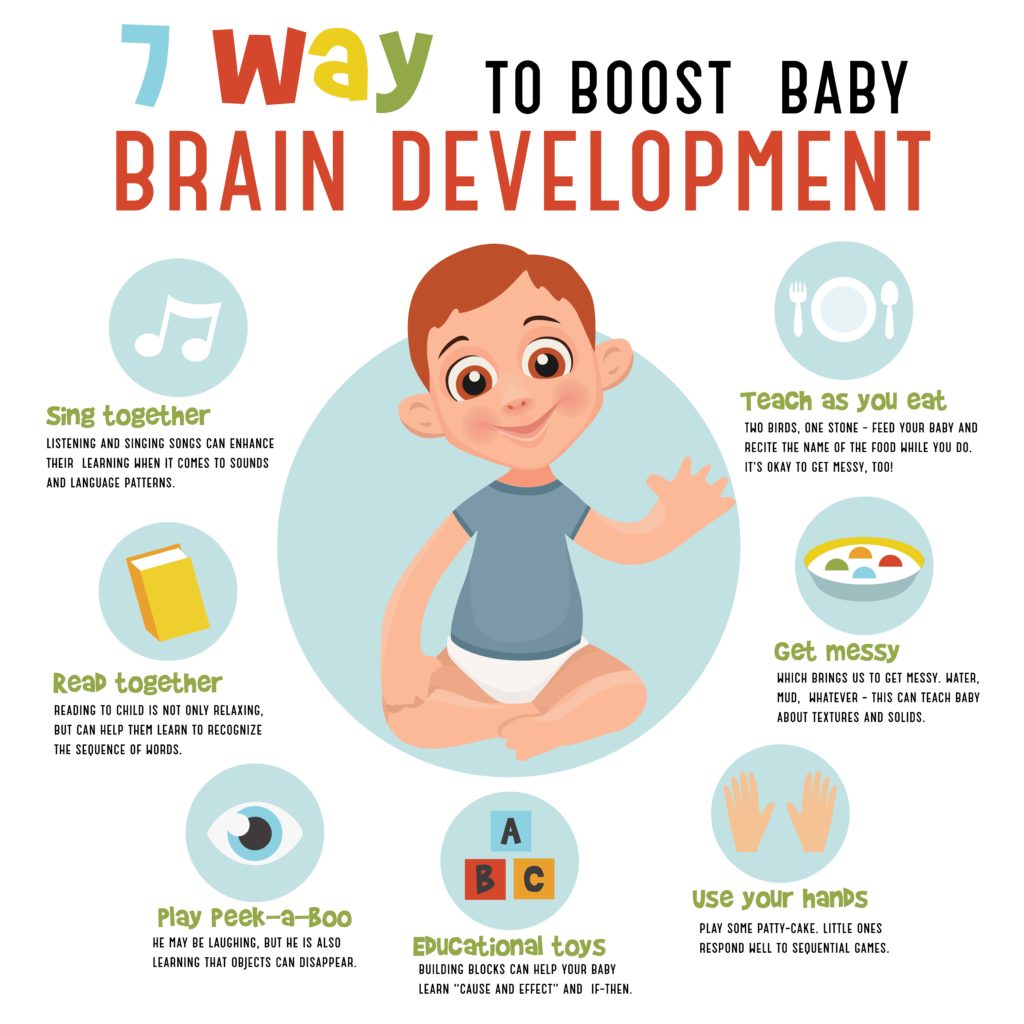
Babies are born with an amazing ability to learn and grow. From the moment they enter the world, their brains are constantly developing, creating new neural connections and pathways that will shape their thoughts, behaviors, and abilities for the rest of their lives. In this article, we’ll explore the fascinating process of babies’ brain development, from the early stages of life to the toddler years.
Table of Contents
Stages of Brain Development

The first stage of brain development begins in the womb, where the foundations for the neural network are laid. During this time, the brain is rapidly growing and developing, creating billions of new neurons and synapses. By the time a baby is born, their brain has already formed the basic structures needed for brain function.
Over the first few months of a baby’s life, the brain continues to develop rapidly, with synapses forming at an incredible rate. By the time a baby reaches six months old, their brain will have doubled in size from birth. During this time, the brain is particularly receptive to learning, making it a crucial window of opportunity for stimulating brain development.
The Importance of Stimulation

Stimulation is crucial for babies’ brain development. By providing a rich environment full of new experiences, you can help your baby’s brain form new connections and pathways, strengthening their neural network and setting them up for future learning.
One of the best ways to stimulate your baby’s brain is through play. Simple activities like singing songs, playing peek-a-boo, and reading books can all help build your baby’s neural network and promote cognitive development.
The Role of Sleep

Sleep is also essential for babies’ brain development. During sleep, the brain consolidates new learning and forms new neural connections. A lack of sleep can disrupt this process, making it harder for babies to learn new skills and retain information.
For optimal brain development, babies need plenty of sleep. Newborns may sleep up to 16 hours a day, gradually reducing to around 12 hours a day by six months of age. As your baby grows and develops, their sleep needs will change, so it’s important to pay attention to their sleep patterns and adjust accordingly.
The Impact of Nutrition

Nutrition plays a crucial role in babies’ brain development. The brain requires a steady supply of nutrients to grow and develop, particularly in the early stages of life.
Breast milk is the ideal source of nutrition for babies, containing all the nutrients they need for healthy brain development. If breastfeeding isn’t an option, formula is a good alternative, providing all the necessary nutrients for brain development.
The Importance of Interaction

Interaction is key for babies’ brain development. Babies learn through social interaction, taking cues from the people around them to shape their understanding of the world.
By interacting with your baby through play, conversation, and other activities, you can help build their social and emotional development, promoting healthy brain development in the process.
The Toddler Years

The toddler years are a critical time for brain development. During this time, the brain is still growing and developing rapidly, creating new neural pathways and connections.
It’s important to continue providing a stimulating environment for your toddler during this time, promoting cognitive, social, and emotional development through play, interaction, and other activities.
The Benefits of Early Intervention

Early intervention can have a significant impact on babies’ brain development. By identifying and addressing developmental delays and challenges early on, you can help your baby build the skills and abilities they need to thrive.
If you’re concerned about your baby’s development, speak to your healthcare provider about early intervention services that may be available in your area.
Conclusion
Babies’ brain development is a complex and fascinating process that begins in the womb and continues throughout the first few years of life. By providing a stimulating environment, promoting healthy nutrition and sleep habits, and supporting social and emotional development, you can help your baby build a strong foundation for learning and growth.
Related Articles
1. The Importance of Play for Babies’ Brain Development
2. How to Promote Healthy Sleep Habits for Your Baby
3. The Role of Nutrition in Brain Development
4. Understanding Your Toddler’s Emotional Development
5. Early Intervention: What You Need to Know
Frequently Asked Questions
1. What are the signs of delayed brain development in babies?
Signs of delayed brain development in babies may include difficulty with motor skills, language development, and social interaction. If you’re concerned about your baby’s development, speak to your healthcare provider.
2. How can I promote healthy brain development in my baby?
You can promote healthy brain development in your baby by providing a stimulating environment, promoting healthy nutrition and sleep habits, and supporting social and emotional development through interaction and play.
3. How much sleep does a baby need for healthy brain development?
Newborns may sleep up to 16 hours a day, gradually reducing to around 12 hours a day by six months of age. As your baby grows and develops, their sleep needs will change, so it’s important to pay attention to their sleep patterns and adjust accordingly.
4. What is early intervention?
Early intervention is a range of services that can help identify and address developmental delays and challenges in babies and young children. These services may include therapy, special education, and other supports to promote healthy development.
5. How can I find early intervention services in my area?
You can speak to your healthcare provider, child’s pediatrician or do a google search to find early intervention services in your area.
